Honour of Annaly - Feudal Principality & Seignory Est. 1172
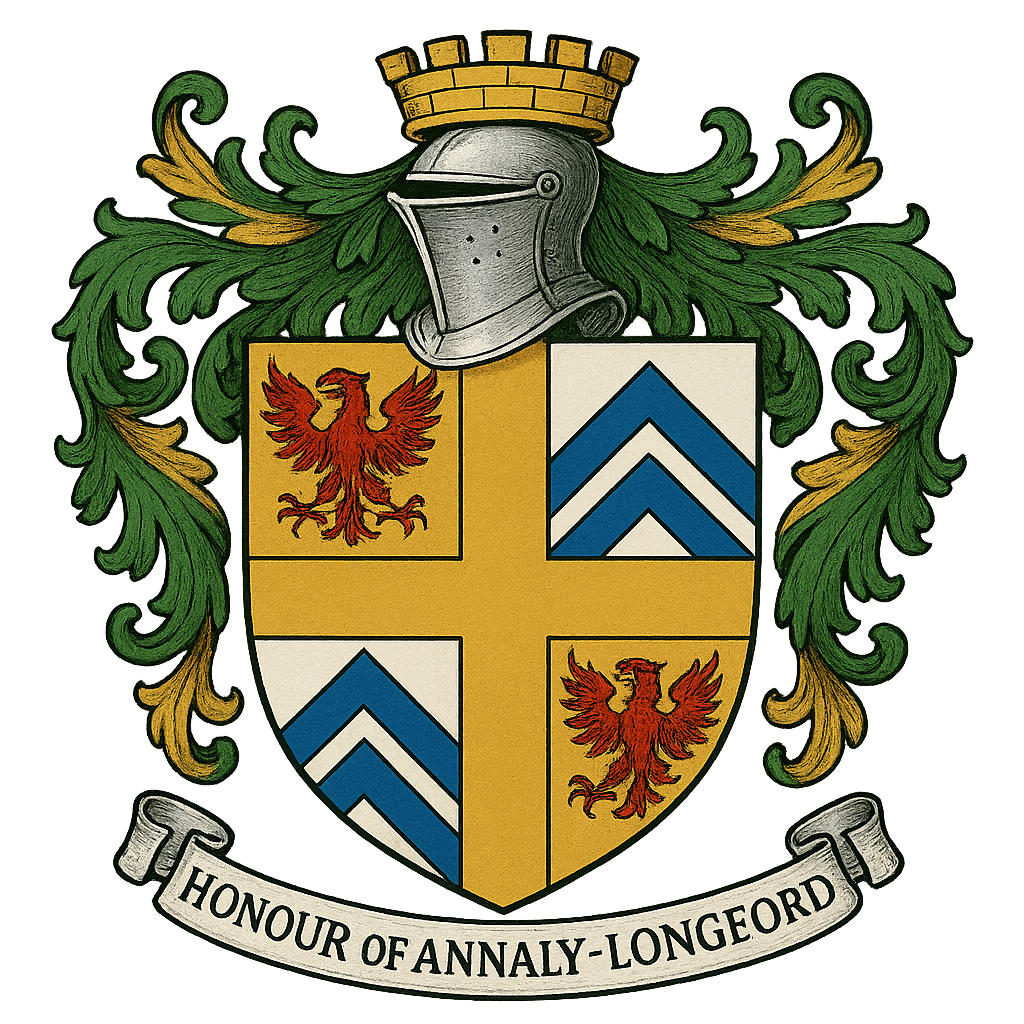
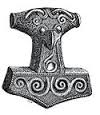



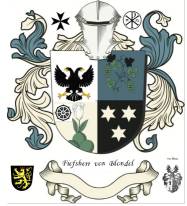
|
Feudal Dictionary
Adulterine Castle - a castle built without a person's liege lord's approval. Aid - A special obligation of a vassal to provide money for such occasions as his lord's ransom, the marriage of his daughter, the knighting of his son, or for going on Crusade. Almoner - Official appointed to distribute alms. Amercement - Payment to the lord of the court by a person found guilty of some trespass in order to have the lord's mercy. The equivalent of a fine in a modern court. Ancient Demesne - Land which was the king's land at the time of the Domesday Book. Ancilla - A female slave. Arpent - a measure of land roughly equal to a modern acre. Assart - A piece of forest or waste, converted into arable land by grubbing up the trees and brushwood. To assart land within a forest without license is a grave crime. Assize - meeting of feudal vassals with the king. Also refers to decrees issued by the king after such meetings. Assize of bread and ale - The statutory regulation or settling of the price of bread and ale, with reference to that of grain, in accordance with the ordinance of 51 Henry III. Bailiff - Manorial official, overseer of the manor, chosen by the lord. Balk - A ridge left between two furrows, or a strip of ground left unploughed as a boundary line between two ploughed portions. Ban - a king's power to command prohibit under pain of punishment or death; used mainly because of a break in the King's Peace. Also a royal proclamation, either of a call to arms or a decree of outlawry. In ecclesiastical terms, an excommunication on condemnation by the Church. Banalities - fees which a feudal lord imposes on his serfs for the use of his mill, oven, wine press, or similar facilities. It sometimes includes part of a fish catch or the preceeds from a rabbit warren. Baron - noble of high rank, in England a tenant-in-chief, holding his lands directly from the king. Benefice-The grant made by a lord, usually of land. Bolting-house - A place where bran is bolted (sifted) from flour. Boon-work - A day's work, given gratuitously to a lord by his men on a special occasion. Bordar - A smallholder. Borough - a town with the right of self government granted by a royal charter. Bovates - An ox-gang, or as much land as an ox could plough in a year; varying in amount from 10 to 18 acres according to the system of tillage. Burgess - the holder of land or house within a borough. Buttery (Middle English botelerie) - store room for beer, wine, and the like. Cantref - a Welsh political and administrative division, similar to the English shire. Caput baroniae - Chief seat of a gentle family. Carucate - a measurement of land, equal to a hide; usedin Danelaw. Castle-guard - Feudal obligation to serve in the garrison of a castle, either for a period each year or during war. Castellan - Governor of a castle. Ceorl - A free man in Anglo-Saxon law. Chamberlain - Household official in charge of a lord's chamber. Chaplain or chancellor - Priest or monk in charge of the chapel and of the secretarial department of the castle. Chevage - An annual poll tax levied by the lord of a manor either on immigrant workers or on villeins allowed to live out of the manor, or on both. Chevauchee (cavalcade) - Feudal duty to accompany the lord on a minor expedition or as an escort. Colee or buffet - Traditional blow administered to the newly made knight at his dubbing. Commune Concilium - Norman equivalent of Anglo-Saxon Witan. Decision taking at such meetings, either judicial or military, were binding on the vassals. Commutation - Conversion of the value of labor services into a monetary payment. Copyhold - The late medieval form of customary tenure, the copy of the court roll entry of admission to a holding serving as the tenant's title-deed. Court-leet - A court held periodically in a lordship or manor, before the lord of his steward, having jurisdiction over petty offences and the civil affairs of the district. Court of Common Pleas - A common law court to hear pleas involving disputes between individuals. Almost all civil litigation was within its term of reference, as was supervision of manorial and local courts. Croft - A piece of enclosed ground, generally adjacent to a house, used for tillage or pasture. Curia Regis - English royal council and court of justice. Curtilage - A small court, yard, or piece of ground attached to a dwelling-house, and forming one enclosing with it. Customal - A written collection or abstract of the customs of a manor. Demesne - Land on a manor not held by free or villein tenants but directly cultivated for the lord by an agent. Denarius - The English silver penny, hence the abbreviation "d". Dooms - Judgments or decisions made formally by the suitors or the jury of the manor court. Dreng - Customary tenant in Northumbria. Earl - Count; highest English title in the Middle Ages. Word is related to Jarl. Also known in earlier times as Ealdorman. Enfeoffment - Investiture with dignities or possessions. Entry Fee - Payment by a tenant as a condition for admission to a holding. Essoin - The allegation of an excuse for non-attendance at a court at the appointed time. Extents - The formal recitation and valuation of the various lands of a manor, and also of the services, rents, profits, etc. of the same. Eyre - The right of a king (or justices acting in his name) to visit and inspect the holdings of any vassal. It was done periodically, usually at irregular intervals of a few years. Felony - In feudal law, any grave violation of the feudal contract between lord and vassal. Later it was expanded in common law to include any crime against the King's peace and came to mean any serious crime Fief, fee, or feud - an estate of land, especially one held on condition of feudal service; a fee., a person's sphere of operation or control. Fine - A sum of money paid to the Crown to obtain some grant, concession, or privilege. Unlike Amercement, a fine was not a monetary penalty, although failure to offer and pay a customary fine for some right would undoubtedly lead to an amercement. Fire-bote - The wood granted to the tenants by a lord for the purpose of fuel. Frankpledge - Medieval English police measure by which a community was divided into groups or tithings, each group responsible for the conduct of its members and for producing them in court if they committed a breach of the law. Free Tenement - A term of wide meaning since it included tenures such as knights' fiefs, urban burgages, and the holdings of free peasants. Freeman of a town - A person entitled, either by birth, privileged admission, or admission by payment, to enter a craft gild or merchant gild of a town, and freely practise a craft or buy and sell within the town. Gavelkind - The name of a form of land-tenure whereby a man's property was divisible among his sons. Also customary free tenure in Kent. Gersuma - A fine paid to the lord on entering upon a holding. Gestum - A guest's portion; an allowance of meat and drink. Guilds - Term applied to trade associations. The aims of such groups was to protect members from the competition of foreign merchants and maintain commercial standards. The first guilds were merchant guilds; later came craft guilds. Guilds maintained a system of education, whereby apprentices served a master for five to seven years before becoming journeymen at about age nineteen. Journeymen worked in the shop of a master until they could demonstrate to the leaders of the guild their ability to be made masters. Gules of August - The first day of August. Hallmote - Manorial court. Haye-bote - The right to take wood or thorns for the repair of fences granted to the peasant by the lord. Hayward - Manorial official in charge of the haies, or hedges, especially in haymaking or harvest times. Heriot - A death-duty to the lord; in the case of a villein on a manor, usually the best beast. The surrender of the best live beast or dead chattel of a deceased tenant due by custom to the lord of whom he held. Hock Day - The second Tuesday after Easter Sunday; in former times an important term-day, on which rents were paid, Hock Day and Michaelmas dividing the rural year into its summer and winter halves. Homage - A body of persons owning allegiance, and attending a manorial court. Honor - Great estate of a tenant-in-chief. Host or ost - Feudal military service in the lord's army. House-bote - The right of a tenant to take wood from his lord's estate for the repair of his house. Hundred - in England, a subidivision of the shire for administrative and judicial purposes with its own court, which originated in the Anglo-Saxon period. Infangenethef - Jurisdiction over a thief apprehended within the lord's manor; the right of a lord to try and amerce a thief caught whithin his manor. Justices of Oyer and Terminer - Justices on circuit commissioned to hear and complete pending cases. Justiciar - The head of the royal judicial system and the king's viceroy or regent when absent from the country. Knight's Fee - In theory, a fief which provided sufficient revenue to equip and support one knight. This was approximately twelve hides or 1500 acres, although the term applies more to revenue a fief could generate than its size; it required about thirty marks per year to support a knight. Launder - A person (of either sex) who washes linen. Leet - The term was used for a subdivision of land in Kent equivalent to a hundred. Leywrite - Fine paid by unchaste bondwoman, normally when discovered to be pregnant but unmarried. Livery - To be given land as a gift from the king. Also meant to be given the right to wear a lord's livery. Man - In this sense to be a lord's man, to owe obligations to, in the forms of labor and service. A woman could be someone's man. Man-at-Arms - A soldier holding his land, generally 60-120 acres, specifically in exchange for military service. Sometimes called a Yeoman. Manor - Estate held by a lord and farmed by tenants who owed him rents and services, and whose relations with him were governed by his manorial court. The unit of territorial lordship, not necessarily coinciding witht eh village or hamlet, often but not invariably containing three elements: demesne, free tenures and customary tenures. Manumission - The act by which a lord free a serf. Marcher lord - Lord of a border district, such as the boundaries of Wales and Scotland. Mark - A measure of silver, generally eight ounces, accepted throughout western Europe. In England it was worth thirteen shillings and four pence, two thirds of one pound. Marshal - Household official in charge of the stables, later a royal officer. Medale - A drinking festivity after the lord's meadows had been mowed. Medkniche - A haymaker's fee, viz. as much hay as the hayward can lift with his middle finger to his knees. Merchet - A fine paid by a servile tenant to his lord for liberty to give his daughter in marriage. Mesnie - Military personnel of a castle household. Messor - An official appointed to oversee the manorial reapers or mowers. Messuage - A portion of land occupied as a site for the dwelling-house and its appurtenances. Moneyer - A person licensed by the crown to strike coins, receiving the dies from the king, and keeping 1/240 of the money coined for himself. Mort Dancestor - A pleading in a royal court, concerning claims by an heir that another had usurped his rightful succession to a free tenement at the death of the parent. Mortuary - A customary gift (usually the second best animal) paid to the parish priest from the estate of a deceased parishioner. Multure - Payment of a fraction of the grain ground to the lord of the mill, or the miller. Naifty - The state of being born in bondage or serfdom. Nativi - Persons of servile birth. Same as Neif. Ordeal - A method of trial in which the accused was given a physical test (usually painful and dangerous) which could only be met successfully if he were innocent. Outfangenethef - The lord's right to pursue a thief outside his own jurisdiction, bring him back to his own court for trial, and keep his forfeited chattels on conviction. Palatinate - In England, a county in which the tenant-in-chief exercised powers normally reserved for the king, including the exclusive right to appoint justiciar, hold courts of chancery and exchequer, and to coin money. The king's writ was not valid in a County Palatinte. Pannage - The payment made to the lord for the privilege of feeding beasts in the woods about the village. Pinfold - A place for confining stray or impounded cattle, horses, etc; a pound. Pittancer - An officer of a religious house who had the duty of distributing charitable gifts or allowances of food. Pone - A writ, whereby an action could be removed from the county court into the royal court. Primogeniture - The right of the eldest son to inherit the estate or office of his father. Pytel - A small field or enclosure; a close. Provost - Feudal or royal magistrate. Quintain - Dummy with shield mounted on a post, used as a target in tilting. Rape - The Sussex equivalent of a Hundred. Rebeck - A musical instrument, having three strings, and played with a bow; an early form of the fiddle. Reeve - Manorial overseer, usually a villager elected by tenants of the manor. Regalian - Royal. Relief - A fine paid by the heir of a vassal to the lord for the privilege of succeeding to an estate. Replevy - To return distrained goods to their owner by process of law. Sake and soke - A right of jurisdiction claimed by some manorial lords. Scutage - Shield-tax, a tax paid in lieu of military service. Seigneur - A man of rank, especially a feudal lord in the ancien régime Seisin - Possession. Selions - A ridge or narrow strip lying between two furrows formed in dividing an open field. Seneschal or steward - President Manager of an estate or a household. Sewery - A store-room for provisions, linen, and other table-furniture. Sheriff - The official who was the chief administrative and judicial officer of a shire. Many of his jobs were taken over by the itenerant justice, coroner, and justice of the peace. He collected taxes and forwarded them to the exchequer after taking his share. Also responsible for making sure the king's table was well stocked while the king was in his county. Sheriff's tourn - The turn or circuit made by the sheriff of a county twice a year, in which he presided at the hundred-court in each hundred of the county. Shilling - Measure of money used only for accounting purposes and equal to 12 pennies. Shire - English county. Sokeman - A free peasant, found in greatest numbers in the East Midlands. Squire - Knight-aspirant. Stinting - Limiting, especially the rights of pasture. Suit of mill - The obligation of tenants to resort to a special mill (usually that of their lord) to have their corn ground. Sulong - A measurement of land in Kent. Equal to two hides. Tallage - A tax levied by a manorial lord upon his unfree tenants. Tally - A notched stick, which was split in two, one half being kept by the seller and the other half by the receiver. Third Penny - The local earl's one third share of fines in shire or hundred courts, often given afterwards to a manor or church as income. Tithing - A company (originally) of ten householders in the system of frank-pledge. Tithingman - The chief man of a tithing. Toft - The site of a house and its outbuildings. Toll - Payment for leave to sell livestock. Ungentle - Not befitting a gentleman. Vassal - A free man who held land (fief) from a lord to whom he paid homage and swore fealty. He owed various services and obligations, primarily military. He was also required to advise his lord and pay him the traditional feudal aids required on the knighting of the lord's eldest son, the marriage of the lord's eldest daughter, and the ransoming of the lord should he be held captive. Villein - A non-free man, owing heavy labor service to a lord, subject to his manorial court, bound to the land, and subject to certain feudal dues. The wealthiest class of peasant. He usually cultivated 20-40 acres of land. Virgate - A measure of land, varying greatly in extent, but very frequently averaging 30 acres. Equal to a quarter of a hide. Woodward - A private forester. Yardland - A peasant holding in the common fields, usually 25-30 acres of arable land with appurtenant meadow, pasture and common rights. Yoke - A measurement of land in Kent equal to one quarter of a Sulong. |
About Longford Feudal Prince House of Annaly Teffia Rarest of All Noble Grants in European History Statutory Declaration by Earl Westmeath Kingdoms of County Longford Pedigree of Longford Annaly What is the Honor of Annaly The Seigneur Lords Paramount Ireland Market & Fair Chief of The Annaly One of a Kind Title Lord Governor of Annaly Prince of Annaly Tuath Principality Feudal Kingdom Irish Princes before English Dukes & Barons Fons Honorum Seats of the Kingdoms Clans of Longford Region History Chronology of Annaly Longford Hereditaments Captainship of Ireland Princes of Longford News Parliament 850 Years Titles of Annaly Irish Free State 1172-1916 Feudal Princes 1556 Habsburg Grant and Princely Title Rathline and Cashel Kingdom The Last Irish Kingdom Landesherrschaft King Edward VI - Grant of Annaly Granard Spritual Rights of Honour of Annaly Principality of Cairbre-Gabhra House of Annaly Teffia 1400 Years Old Count of the Palatine of Meath Irish Property Law Manors Castles and Church Lands A Barony Explained Moiety of Barony of Delvin Spiritual & Temporal Islands of The Honour of Annaly Longford Blood Dynastic Burke's Debrett's Peerage Recognitions Water Rights Annaly Writs to Parliament Irish Nobility Law Moiety of Ardagh Dual Grant from King Philip of Spain Rights of Lords & Barons Princes of Annaly Pedigree Abbeys of Longford Styles and Dignities Ireland Feudal Titles Versus France & Germany Austria Sovereign Title Succession Mediatized Prince of Ireland Grants to Delvin Lord of St. Brigit's Longford Abbey Est. 1578 Feudal Barons Water & Fishing Rights Ancient Castles and Ruins Abbey Lara Honorifics and Designations Kingdom of Meath Feudal Westmeath Seneschal of Meath Lord of the Pale Irish Gods The Feudal System Baron Delvin Kings of Hy Niall Colmanians Irish Kingdoms Order of St. Columba Chief Captain Kings Forces Commissioners of the Peace Tenures Abolition Act 1662 - Rights to Sit in Parliament Contact Law of Ireland List of Townlands of Longford Annaly English Pale Court Barons Lordships of Granard Irish Feudal Law Datuk Seri Baliwick of Ennerdale Moneylagen Lord Baron Longford Baron de Delvyn Longford Map Lord Baron of Delvin Baron of Temple-Michael Baron of Annaly Kingdom Annaly Lord Conmaicne Baron Annaly Order of Saint Patrick Baron Lerha Granard Baron AbbeyLara Baronies of Longford Princes of Conmhaícne Angaile or Muintir Angaile Baron Lisnanagh or Lissaghanedan Baron Moyashel Baron Rathline Baron Inchcleraun HOLY ISLAND Quaker Island Longoford CO Abbey of All Saints Kingdom of Uí Maine Baron Dungannon Baron Monilagan - Babington Lord Liserdawle Castle Baron Columbkille Kingdom of Breifne or Breny Baron Kilthorne Baron Granarde Count of Killasonna Baron Skryne Baron Cairbre-Gabhra AbbeyShrule Events Castle Site Map Disclaimer Irish Property Rights Indigeneous Clans Dictionary Maps Honorable Colonel Mentz Valuation of Principality & Barony of Annaly Longford“The Princely House of Annaly–Teffia is a territorial and dynastic house of approximately 1,500 years’ antiquity, originating in the Gaelic kingship of Teffia and preserved through the continuous identity, property law, international law, and inheritance of its lands, irrespective of changes in political sovereignty.”
Feudal Baron of Longford Annaly - Baron Longford Delvin Lord Baron &
Freiherr of Longford Annaly Feudal Barony Principality Count Kingdom of Meath - Feudal Lord of the Fief
Blondel of the Nordic Channel Islands Guernsey Est. 1179 George Mentz
Bio -
George Mentz Noble Title -
George Mentz Ambassador - Order of the Genet
Knighthood Feudalherr - Fief Blondel von der Nordischen
Insel Guernsey Est. 1179 * New York Gazette ®
- Magazine of Wall Street - George
Mentz - George
Mentz - Aspen Commission - Ennerdale - Stoborough - ESG
Commission - Ethnic Lives Matter
- Chartered Financial Manager -
George Mentz
Economist -
George Mentz Ambassador -
George Mentz - George Mentz Celebrity -
George Mentz Speaker - George Mentz Audio Books - George Mentz Courses - George Mentz Celebrity Speaker Wealth
Management -
Counselor George Mentz Esq. - Seigneur Feif Blondel - Lord Baron
Longford Annaly Westmeath
www.BaronLongford.com * www.FiefBlondel.com |
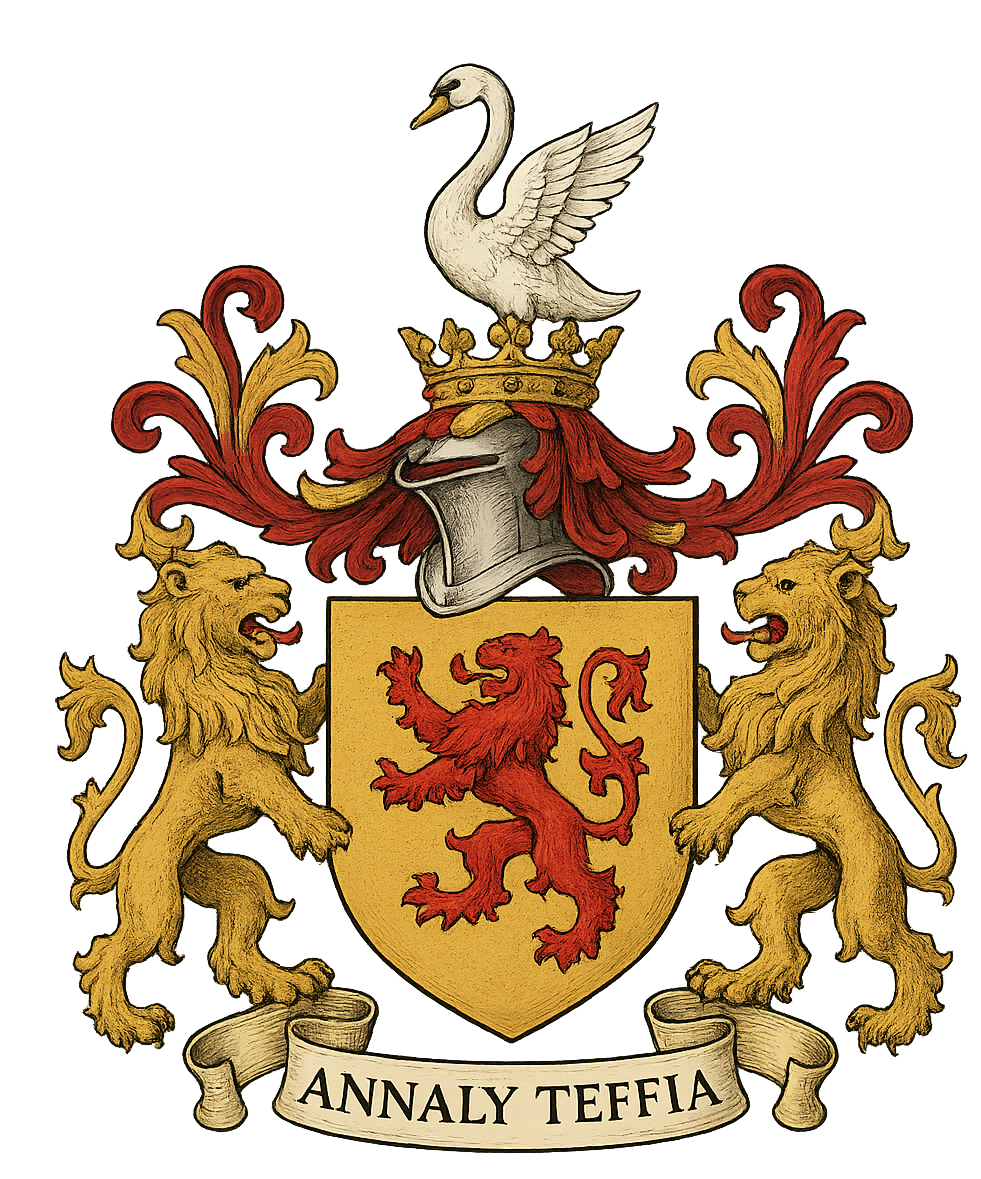
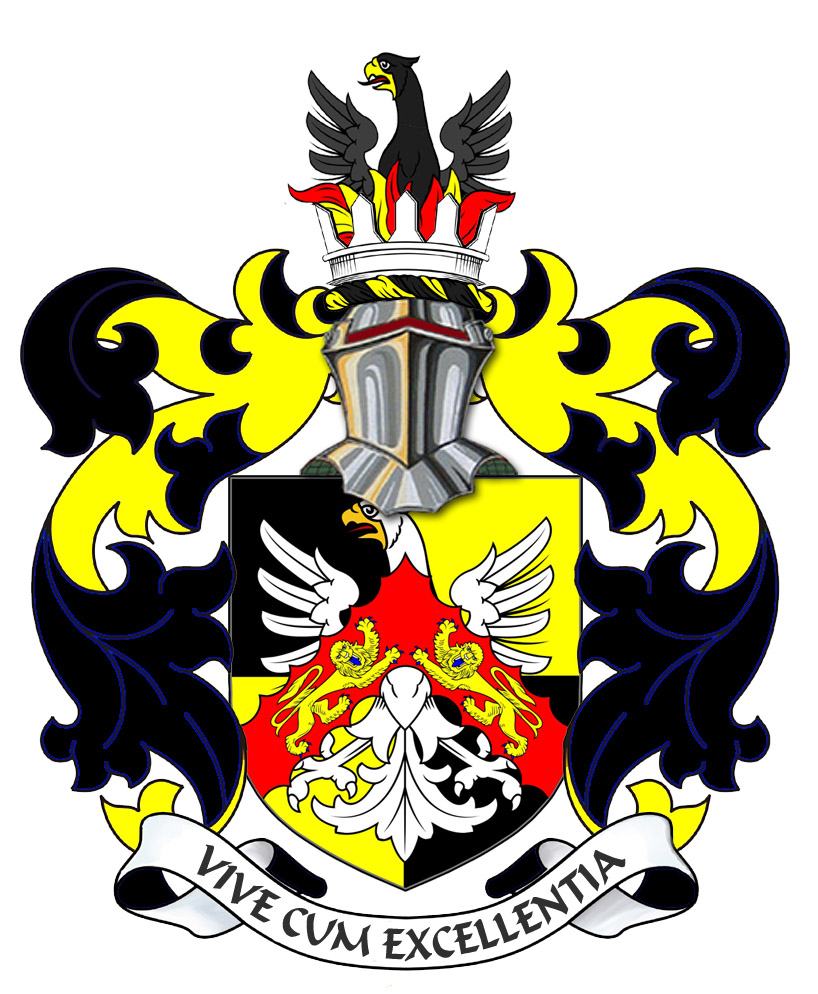
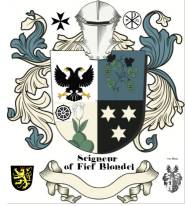


Commissioner George Mentz - George
Mentz Law Professor - George
Mentz Economist
George Mentz News -
George Mentz Illuminati Historian -
George Mentz Net Worth
The Globe and Mail George Mentz
Get Certifications in Finance and Banking to Have Career Growth | AP News
